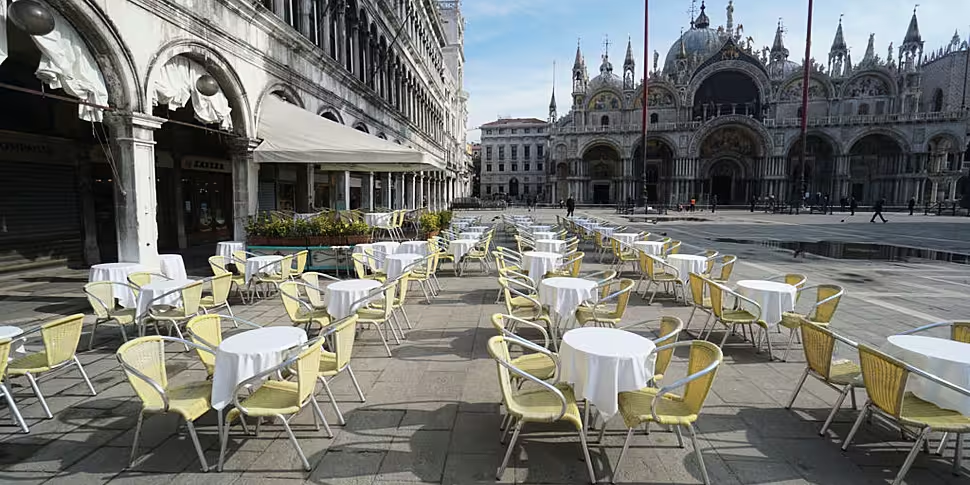All of Italy is being put into a partial lockdown from this morning as authorities attempt to stop the spread of coronavirus in the country.
Movement is being restricted and public gatherings are being banned as the whole nation becomes a 'protected zone'.
Tánaiste Simon Coveney said Irish people are now being advised against travel to all of Italy due to the situation there.
In light of internal developments in Italy my department is upgrading travel advice to Irish citizens, recommending against travel to whole of Italy.
The Taoiseach will today raise the issue of flights & further EU-wide responses at a meeting of the European Council. @COVID19— Simon Coveney (@simoncoveney) March 10, 2020
The restrictions had already been in place for Lombardy and other areas in the north of the country - but the government announced on Monday night that the lockdown was being extended nationwide.
Around 60 million people are now being encouraged to stay at home wherever possible, with cinemas, bars, museums and other sites to remain closed over the coming weeks.
Only those with "urgent" work, health or family reasons will be allowed travel while the restrictions are in place, with temperature checks being put in place at train stations.
Signing the necessary decree, Prime Minister Giuseppe Conte said the "health of our loved ones, our parents, our children, our grandparents" was at stake.
He said that everybody had to give something up "for the good of the community".
Il futuro dell’Italia è nelle nostre mani. Facciamo tutti la nostra parte, rinunciando a qualcosa per il bene della collettività. In gioco c’è la salute dei nostri cari, dei nostri genitori, dei nostri figli, dei nostri nonni. Ho appena firmato il decreto #iorestoacasa pic.twitter.com/Cagtzf7hnQ
— Giuseppe Conte (@GiuseppeConteIT) March 9, 2020
The restrictions will be in place until 3rd April.
Italy has been the European country worst affected by the Covid-19 outbreak, with more than 9,000 confirmed cases and a death toll of over 460.
EU leaders are due to hold a video conference this evening about the bloc-wide response to the outbreak.
Ireland
Meanwhile, three more cases of coronavirus were confirmed in the Republic of Ireland yesterday evening - bringing the total number of confirmed Covid-19 cases here to 24.
Two of the cases are in the south of the country, while one is in the west.
All are females who were in close contact with a confirmed case, while one of those in the south is also a healthcare worker.
Last night the government announced a €3 billion fund to help deal with the virus - primarily to fund sick pay and illness benefit for any employees required to self-isolate.
St Patrick’s Day parades, including the Dublin parade, will not proceed. This is based on the advice of the National Public Health Emergency Team. The situation in relation to other events & mass gatherings is under review & will be guided by public health advice. #COVID19
— Leo Varadkar (@LeoVaradkar) March 9, 2020
€200 million is being designated for businesses, while €435 million is being given to the HSE to 'scale up its actions' to respond to the outbreak.
St Patrick's Day parades across the country have been cancelled.
The National Public Health Emergency Team is due to meet today to consider the next steps in Ireland's response to the outbreak.
Dr Tony Holohan, Chief Medical Officer at the Department of Health, said Ireland remains in the containment phase for now - but will 'eventually' move to a delay phase and then a mitigation phase.
He explained: “Containment is about identifying and containing all cases no matter how mild.
"The delay phase will focus on minimising the spread of the virus.
"Ultimately, in mitigation phase, we prioritise the cases that are most unwell."
He said the decision to move to the delay phase will be based on factors such as the number of confirmed cases and the speed at which they are occurring.









